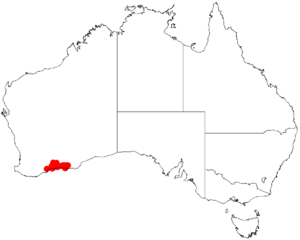Acacia curvata facts for kids
Quick facts for kids Acacia curvata |
|
|---|---|
| Scientific classification | |
| Genus: |
Acacia
|
| Species: |
curvata
|
 |
|
| Occurrence data from AVH | |
Acacia curvata is a type of shrub that grows only in a specific area of southwestern Australia. It belongs to the large plant group called Acacia, which are often known as wattles.
What it Looks Like
This shrub usually grows to be about 0.3 to 1.5 meters (1 to 5 feet) tall. It has many branches that spread out. Its small branches are covered in dense hairs, and it has small, dry leaf-like parts called stipules that stay on the plant.
Like most Acacia plants, it doesn't have true leaves. Instead, it has special flattened stems called phyllodes that act like leaves. These phyllodes are smooth, stiff, and have a sharp point. They are packed closely along the branches. The phyllodes are curved like a scimitar (a curved sword) and are about 5 to 20 millimeters long and 1 to 3 millimeters wide. They have three clear main veins.
Acacia curvata blooms from May to July, producing bright yellow flowers.
How it Got its Name
The plant was first officially described by a botanist named Bruce Maslin in 1977. This description was part of his research published in a science journal called Nuytsia.
Later, in 2003, another botanist named Leslie Pedley reclassified it and gave it a different scientific name, Racosperma curvatum. However, in 2006, it was moved back to the Acacia group, which is where it remains today.
Where it Grows
Acacia curvata is found only in the Goldfields-Esperance region of Western Australia. It often grows in clay soils that can contain lateritic gravel (a type of reddish soil).
You can find this shrub in areas from Ravensthorpe in the west, down to Kundip in the south, and as far east as Munglinup. It also grows in the Scaddan–Wittenoom Hills area, where it is part of open scrubland plant communities.

